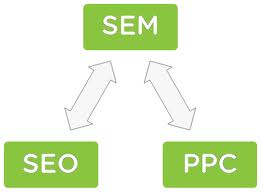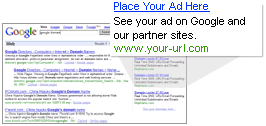Here is an analogy I particularly like….
Suppose your friendly Yellow Pages salesperson said to you, “I’m willing to put any ad you want on as many pages as you want, and the only time you have to pay me is when someone goes to your website”.
Would you be interested in a deal like that? Well, that is what Pay-Per-Click advertising is like. You only pay when someone clicks on your ad and is delivered to your web site. And remember what the Yellow Pages salesperson said about “on as many pages as you like”? Well, today if you advertise in the Yellow Pages, you are probably under one or maybe two categories or headings. With Search Engine Marketing, you can be under as many “categories” as you feel are appropriate for your business. These are called “keywords” or “keyword phrases”.
Perhaps a question & answer forum will help…
 |
“But I already pay someone do Search Engine Optimization (SEO) to make sure I am highly ranked for my keywords. ”If they are doing SEO, then here are some things to consider: |
- Making your website “search engine friendly” is not the same as search engine optimization. There is a really big difference.
- Your SEO campaign is probably limited to a relatively small number of keywords that are applicable to your business. PPC offers an unlimited number of keywords.
- What is displayed in the search results is likely a chopped up collection of words from a page on your site. It isn’t a compelling marketing message with a call to action that SELLS!
- It typically takes 3-6 months for the search engines to identify any changes to your site and then “re-index” your site for the new keywords. Changing or adding keywords with PPC takes a matter of minutes.
- If your serve a national market, then using SEO in conjunction with PPC is a viable strategy. However, if you are a small business serving a local market then SEO alone is limited in what it will do for you. For example, you can’t geographically target the audience unless you include the name of the city in the keyword. If you perform SEO on the keyword “real estate agent”, you are “optimizing” for the entire country and competing against everyone else who optimizes for that keyword.
- If your employee or contractor is using techniques the search engines forbid, your site could get permanently banned! For many businesses, their brand, company name or web site URL, is very valuable to them and loosing the ability to be found using a search engine would have a traumatic effect on their on-line presence.
 |
“Why can’t my IT person or web developer do this?” |
I can’t count the number of times a prospect has come to me after they have let their web developer create and manage their Google Ads account. In most cases the person was very good at web development and said, “sure, I know how to use Google Ads”. The thing is, Google Ads is deceptively simply, but devilishly complex. Almost anyone with basic computer skills can open an Google Ads account and drive traffic to a website. However, doing it in a way that produces an optimal ROI is quite another thing. But for the sake of discussion, let’s assume her or she….
- Has some knowledge of search engine marketing
- Has some experience with Pay-Per-Click
- Has extensive experience with the major search engine paid search programs and is up-to-date
- Has the software tools necessary to perform the keyword research and on-going maintenance
- Has done the research to know what keywords will perform well in your industry, in your industry segment and in your local area
- Has the time to devote to this effort on a priority basis
- Then assuming they have other duties and their time has value, you will probably be paying them more than I would charge. And if they are not at least as effective as I am, you won’t be getting a good return on your investment!
 |
“Where will my ad appear and what will it look like?” While I work with several different “search providers”, by far the most effective is Google Ads. If you go to www.Google.com and search for a product or service, you will be able to see in a pink shaded area on the top and down the right-hand side of the screen, a list of “Ads”. This is where your ad would appear. Try it, and see what it looks like. Google is the most popular search engine and your ad could appear for as many keywords as you would like. |
Still think you might want to try it yourself? Jump to the page Secrets of Pay-Per-Click!

